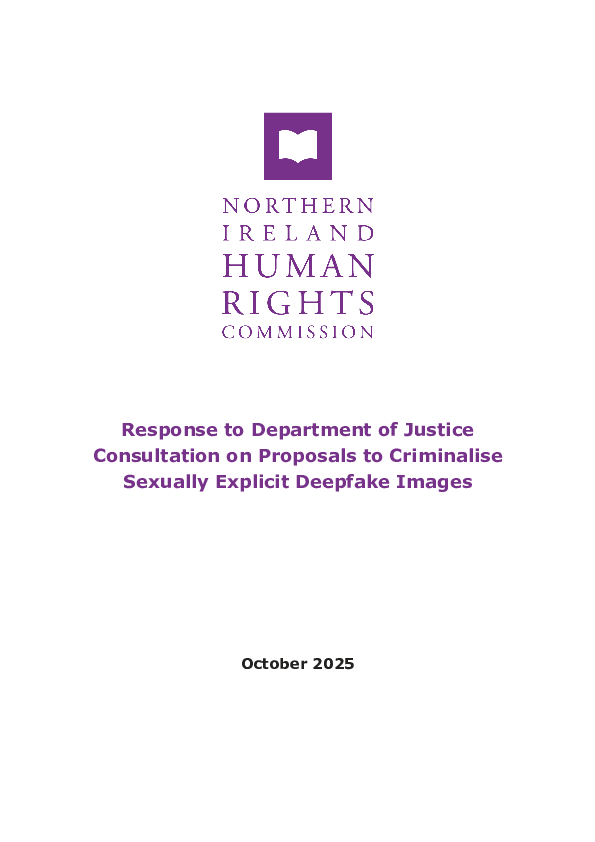NIHRC Consultation Response: Department of Justice Consultation on Proposals to Criminalise Sexually Explicit Deepfake Images
Date produced: October 2025
Below is a summary of the Northern Ireland Human Rights Commission's (NIHRC) recommendations and messages.
You can also download the full document through the links provided.
Summary of Recommendations
The NIHRC recommends that the Department of Justice:
2.21 ensures that the proposed legislation is designed and implemented in a way that effectively protects victims from the online activities of third parties and safeguards their meaningful participation in public life, both online and offline. This requires a gender-sensitive approach.
2.22 ensures that the proposed legislation provides for effective remedies for victims of deepfakes, in accordance with Article 13 of the ECHR.
2.31 ensures that the proposed legislation is aligned with the standards set out in UN CEDAW and the Istanbul Convention to address the digital dimension of gender-based violence, particularly regarding effective prevention, support for victims and a holistic response to non-consensual sexually explicit deepfakes.
2.35 ensures that legislation criminalising creating or requesting the creation, or sharing or threatening to share, non-consensual sexually explicit deepfakes is embedded in human rights law, including the standards applicable to digital gender-based violence. Also, that this is clear and adaptable to artificial intelligence developments, with a view to providing for meaningful redress for victims and ensuring that perpetrators are effectively investigated, prosecuted and convicted.
3.6 adopts a victim-centred approach in the design, implementation and monitoring of the legislation. This includes consideration of ensuring that a holistic approach is adopted.
3.10 adopts a gender-sensitive approach in the design, implementation and monitoring of the legislation, with due consideration of intersectionality.
3.14 includes a definition of consent within the legislation that ensures consent is freely given and addresses circumstances where informed consent has not been given.
3.19 clarifies whether the intention to control or coerce falls within the intention to cause ‘humiliation, alarm or distress’, or if an additional specific motive should be added to the proposed legislation. Alternatively, whether creating or requesting the creation, or sharing or threatening to share a non-consensual sexually explicit deepfake with the intention to control or coerce would be covered by the legislation on controlling and coercive behaviour instead.
3.23 considers extending the offences within the proposed legislation to include scenarios where the perpetrator is targeting a person who is close to the individual depicted in the image.
3.25 specifies within the proposed legislation that offences with the motive of obtaining sexual gratification can include the perpetrator's gratification or that of other individuals.
3.27 clarifies that the offences within the proposed legislation do not require proof of harm to protect victims from re-victimisation and excessive restrictions on prosecutions.
3.35 introduces within the proposed legislation a summary-only base offence of intentionally creating or requesting the creation or sharing or threatening to share a sexually explicit deepfake image without consent, or a reasonable belief in consent, regardless of motive.
3.36 includes within the proposed legislation a reasonable excuse defence to avoid over-criminalisation when sharing this type of image is necessary for reporting, preventing, detecting, investigating, or prosecuting a crime, or for the administration of justice. This defence must be clearly defined and balanced, to ensure accountability without unintentionally criminalising individuals who report crimes.
3.37 ensures the proposed legislation does not create an unintended gap in protection for victims in NI compared to other UK jurisdictions.
3.42 includes a definition of sexually explicit deepfakes within the proposed legislation that is clear enough to capture and keep pace with rapidly evolving artificial intelligence technology and its different uses, with a view to ensuring that victims are adequately protected.
3.47 includes within the proposed legislation express mention of the best interests of the child principle, as a primary consideration, regarding child offenders.
3.53 introduces specific provisions within the proposed legislation that assist law enforcement agencies and victims to remove non-consensual sexually explicit deepfakes from the internet to prevent re-victimisation.
3.54 ensures there is access to adequate compensation and appropriate redress mechanisms for harm caused by the creation or sharing of non-consensual sexually explicit deepfakes, particularly when removing content is unsuccessful or ineffective.
3.59 has a clear plan, with committed resources in place, to ensure up-to-date specialised training is available and provided as required (including refresher training) to relevant professionals and anyone who may come in contact with victims or deal with a complaint during a victim’s journey through the criminal justice system. This training should be sensitive to gender-based violence and sexual abuse, as well as to the experiences of marginalised groups such as disabled persons, lesbian, gay, bisexual, transgender, queer or questioning, intersex, asexual persons, children, and persons of national or ethnic minority backgrounds.
3.60 ensures that there is adequate capacity within law enforcement agencies to detect deepfakes and facilitate the collection of evidence, to enable effective investigations and prosecutions.
3.64 has a clear plan, with committed resources in place, for promoting education and awareness raising initiatives, focusing on prevention and encouraging reporting, the meaning of consent, healthy relationships, and the prevention of gender-based violence. It should also address privacy, promote non-discrimination and gender equality, digital literacy and online safety.
3.71 works with the NI Executive to ensure the integration of a human rights-based approach into the deployment of artificial intelligence systems by businesses into their operations, products and services. This includes ensuring that businesses are required to undertake robust content moderation and removal through proactively identify risks of harm, taking effective measures to address incidents, and cooperating with law enforcement agencies, civil society, and public authorities in NI and internationally to protect individuals from harm and prevent re-victimisation.
3.72 introduces a ban on online platforms that primarily facilitate the creation of non-consensual sexually explicit deepfake content, such as tools marketed as ‘nudifying’ services to protect people at risk of becoming victims or offenders.

Download Documents
Your browser is out-of-date!
Update your browser to view this website correctly. Update my browser now